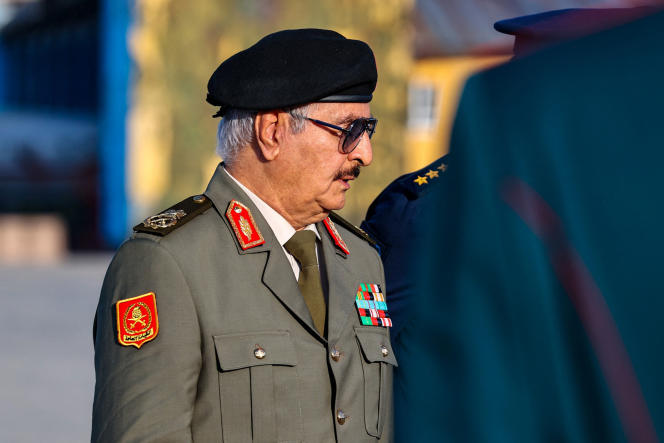Eastern Libyan strongman Marshal Khalifa Haftar was received Thursday, September 28 by Russian President Vladimir Putin in Moscow, his Libyan Arab Armed Forces (or Libyan National Army, LNA) and the Kremlin announced . Marshal Haftar “met with Russian President Vladimir Putin and Russian Defense Minister Sergei Shoigu in the Russian capital Moscow”announced the ANL on its official Facebook page, without giving details.
Kremlin spokesman Dmitry Peskov confirmed the meeting to the Russian state agency TASS. “The situation in Libya and the entire region was discussed”, he declared, without detailing further. This is the first meeting between the two men since 2019, according to Libyan media.
Mr. Haftar arrived in Russia on Tuesday to discuss with that country’s officials the situation in Libya and bilateral relations, according to the ANL. He was received by Russian Deputy Defense Minister Yunus-bek Evkurov, who traveled to eastern Libya several times to meet the marshal.
Their last meeting was on September 17, at the ANL headquarters in Benghazi, a few days after the floods which left thousands dead and missing in the town of Derna, in eastern Libya.
Diplomatic offensive in Africa
For several years, Russia has been leading a diplomatic offensive in Africa to supplant traditional Western powers there. Isolated on the international scene and in search of allies, it has increased its efforts tenfold since the start of its assault against Ukraine in February 2022.
Moscow maintains close relations with Marshal Haftar, who used mercenaries from the Russian paramilitary group Wagner in his failed attempt to seize the capital, Tripoli, from April 2019 to June 2020. This failure was followed in October 2020 of a ceasefire agreement, compliance with which is supervised by a military commission composed of five officers from each camp.
Since then, hundreds of members of the Wagner Group have remained active in the East, which is also the area of oil terminals, and in the south of Libya, despite the departure of part of their workforce to Mali or to the Ukraine to fight alongside the Russian army.
Wracked by divisions since the fall of Muammar Gaddafi in 2011, Libya is governed by two rival administrations: one in Tripoli, in the west, led by Abdel Hamid Dbeibah and recognized by the UN, the other in the East, embodied by Parliament and affiliated with the camp of Khalifa Haftar.
